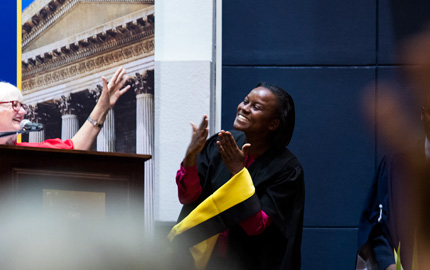Deaf MA grad a Wits first
- Wits University
First Deaf student graduates with Master of Arts in South African Sign Language.
Wits student Nyeleti Nokwazi Nkwinika, who is Deaf and uses South African Sign Language as her first language, graduated today with a Master of Arts (MA) degree by dissertation in South African Sign Language (SASL) using filmed SASL as the language to report on her research.
Nkwinika is the first person (Deaf or hearing) to receive a Master’s from the SASL Department and the first Wits graduate to use a marginalised language (SASL) to report on her research into the possible origins of the vocabulary of SASL.
Nkwinika’s research investigates the borrowing of lexical items in SASL and aims to find out the extent of lexical borrowings from Irish Sign Language, British Sign Language and American Sign Language.
Her dissertation, titled: An investigation of lexical borrowing in the South African Sign Language (SASL) lexicon was jointly supervised in the SASL and Linguistics departments. 
The SASL Department began offering postgraduate degrees in 2013 when Nkwinika was among the first group of four honours students. She went straight on to register for a Master’s by research in the SASL and Linguistics departments in January 2014, which was the first time that SASL offered an MA.
Her studies were partially funded by the Department of Arts and Culture through a bursary programme for studies in marginalised South African languages administered by the Department of Translation and Interpreting at Wits University.
At a celebratory function held for Nkwinika earlier today, she thanked those who had supported her throughout her studies.
“ I just want to say thank you all for coming here. It has been a long time of passionate studying – it is coming to an end. I just want to say thank you to my family, my friends, and my interpreters. Thank you everyone. I am very excited today and it is great to have everyone here.
She says her studies were not easy, but she persevered.
“It has been a struggle! It has been challenging. I was actually quite fed up with this at some point. I wanted to give up because there were continual updates, but my goal was to graduate. I can now relax. I have achieved what I wanted to,” says Nkwinika.
Dr Ruth Morgan, one of her supervisors says that the education sector needs people with Nkwinika’s expertise.
“This is a great step forward in terms of decolonising the University and creating a multilingual platform for research reporting. Although SASL is not yet an official 12th language in South Africa, it is considered official for educational purposes in terms of the SA Schools Act. SASL is also constitutionally protected as a language to be developed,” says Morgan.
Nkwinika intends to study for a postgraduate certificate in education (PGCE) next year at the Wits School of Education so she can use her expertise in SASL as an educator.
